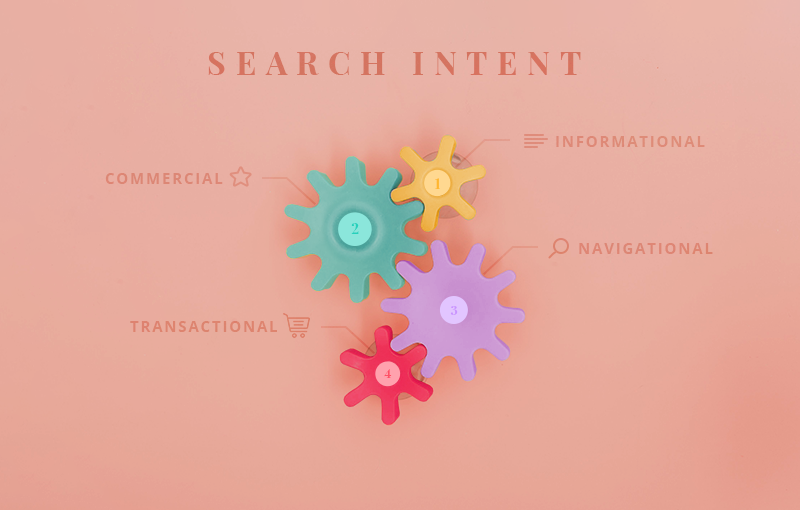
While it is true that, in the SEO world, the only constant is change, there is one exception to the rule - Google has always and will always curate the SERPs in a way that best meets the searchers' needs. To do this, Google takes into account a number of factors - the searcher’s geolocation, browsing history, and intent being among the most important ones.
As an online store owner, there’s not much you can do about your customers’ geolocation and browsing history. However, there’s plenty you can do when it comes to optimizing your Shopify store for search intent.
There are four types of search intent - informational, commercial, navigational, and transactional. Each of them is an integral part of the customer journey.
There are two important things to know about customer journeys:
- Each shopping experience is unique; thus, no two customer journeys are alike.
- Since customers have complex needs and expectations, the customer journey isn’t necessarily linear.
In fact, when someone wants to buy something, they rarely start from point A (need), go through point B (research/consideration) and then go straight to point C (purchase). Instead, a customer may go through the research phase several times before completing the checkout process - they may consider several products, they may compare brands, or change their mind about buying a specific item, and much more.
This means that, if you want to rank high on the SERPs and increase customer LTV (life-time value), you must optimize your Shopify store for each type of search intent. This 18,500+ words guide will help you do it. So, tie your trekking shoes and embark on this adventure with us!



The mountains we'll climb
- Informational search intent
- Commercial search intent
- Navigational search intent
- Transactional search intent
Informational search intent
If a customer has informational search intent, they may be in the very beginning of their customer journey (i.e. in the early research stages), but they may also be past the consideration stage, or in the post-purchase phase. Whatever the case, they need information.
Queries with informational search intent contain words like “what is”, “what are”, “how to”, “best way to”, “where to”, “alternatives”, “can”, “will”, “top tips”, etc.
Learn why optimizing your Shopify store for informational search intent is important and how to do it → How To Optimize Your Shopify Store For Informational Search Intent
Commercial search intent
To buy, or not to buy, that is the question.
Shakespeare and puns aside, optimizing your Shopify store for commercial search intent is key to persuading hesitant buyers to convert.
“Why?”, you may ask.
Commercial queries combine two types of search intent - informational and transactional. In other words, when a query shows commercial search intent, the customer is (usually) past the awareness stage of their journey and is now getting closer to making a purchase.
However, they are still not 100% sure about the brand or the product they chose, i.e. they are still in the consideration stage. Which means that they still need information. Only now they need more specific information and, as a result, their queries are more focused on specific brands or products.
To optimize your Shopify store for commercial search intent, you need to create content that provides such information, as well as organize and optimize your website in a way that builds you up and boosts your credibility (e.g. add product reviews, customer testimonials, case studies, and more).
Learn how to do this → How To Optimize Your Shopify Store For Commercial Search Intent
When a customer’s query shows navigational search intent, the customer usually has a very clear idea of what they want to do. Or, more specifically, an idea of where they want to “go”, i.e. which page of your Shopify store they want to visit.
Navigational search queries are easily recognizable because they contain branded keywords (either the name of your brand, the name of a product, or anything else associated with your business).
When it comes to navigational search queries, the probability of conversion is high. This is why optimizing your Shopify store for navigational search intent is important.
Learn how to optimize your Shopify store for navigational search intent (including which pages need optimization), take a closer look at the best practices and get inspired by some amazing examples → How To Optimize Your Shopify Store For Navigational Search Intent
Transactional search intent
When a customer’s query shows transactional search intent, the customer has a very clear intention to buy something, book a flight, or a hotel, make a reservation at a restaurant, and more.
In other words, the customer is at the end of the conversion funnel. All their past actions and queries have led to this moment - they now know that your brand is trustworthy and want to spend money on your products. There is a high chance that they even know exactly which product (or products) they want to purchase.
Therefore, it is essential that you provide a seamless shopping experience, i.e. optimize your Shopify store for transactional search intent.
To optimize your Shopify store for transactional search intent, you need to optimize your store for conversions. This means that you need to optimize all your product pages, personalize the shopping experience, streamline the checkout process, make transactions transparent and, last but not least, optimize the post-purchase experience and build brand loyalty.
Learn how to do this → How To Optimize Your Shopify Store For Transactional Search Intent
Wrap-up
Optimizing your Shopify store for search intent is paramount - it will help you provide better (i.e. more informed, seamless, and immersive) shopping experiences, it will help you build brand loyalty and increase customer LTV, and more. Ultimately, it will help you build a brand (and a website) that both humans and search engines love!
We hope this guide will give you the expertise and tools needed to achieve this! If you have further questions, don't hesitate to drop us a line in the comments!







